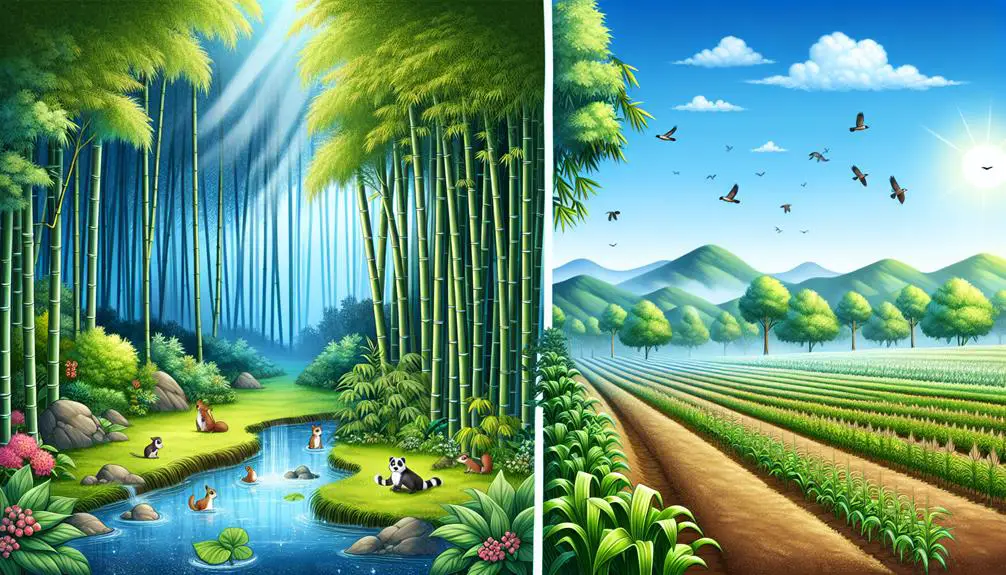Bamboo is super important to agriculture because it grows incredibly fast and doesn't need much babying. I'm talking about growing over 3 feet a day and maturing in just 5 years! It's also great for the planet, absorbing loads of CO2 and pumping out 35% more oxygen than hardwood trees. Plus, its extensive root system helps prevent soil erosion, making it a champ for keeping farmland intact. Bamboo thrives in a bunch of different climates and soil types, and you don't need to mess with fertilizers or pesticides. There's so much more to learn about how bamboo supports sustainable farming practices!
Table of Contents
Key Takeaways
- Bamboo stabilizes soil and prevents erosion, crucial for protecting agricultural lands.
- It grows rapidly and matures in 5 years, providing a renewable resource.
- Requires no synthetic fertilizers or pesticides, reducing reliance on chemical inputs.
- Supports biodiversity by providing habitats and fostering a healthy ecosystem.
- Contributes to sustainable biofuel production with its high biomass yield.
Rapid Growth and Sustainability
Bamboo grows incredibly fast, shooting up over 3 feet in just one day, making it a superb choice for sustainable agriculture. This fast growth means I can harvest it way sooner than traditional hardwoods—just 5 years until it's mature. That's a game changer in the world of farming where waiting decades for trees like oak to grow is the norm.
Besides its speed, bamboo is a renewable resource. This means once I cut it down, it just grows back without needing to replant. This cycle isn't only low-maintenance but it keeps the resource sustainably available, without depleting it. It's a win-win for me and the environment.
Moreover, bamboo's knack for carbon sequestration is impressive. It absorbs carbon dioxide and pumps out 35% more oxygen compared to hardwood trees. This helps me fight against global warming right from my backyard. Integrating bamboo into my agricultural practices isn't just about growing plants quickly; it's about contributing to a healthier planet.
All these factors make bamboo a cornerstone of sustainable agricultural practices. It's fast, it's forgiving, and it's fiercely eco-friendly. What's not to love?
Soil Erosion Prevention
I've found that the extensive root system of bamboo is key in preventing soil erosion on my farm. This plant's roots bind the soil together, reducing runoff and maintaining soil structure. It's incredible how effective bamboo is at keeping the soil right where it needs to be, despite the challenges posed by water and wind.
Bamboo's rhizomes not only stabilize the ground but also help retain essential nutrients, ensuring they're available for other plants too. It's a natural solution that enhances the resilience of agricultural landscapes.
Here's a quick glance at how bamboo contributes:
| Feature | Benefit to Soil | Impact on Farming |
|---|---|---|
| Extensive Root System | Stabilizes soil and prevents erosion | Reduces need for barriers |
| Nutrient Retention | Holds essential nutrients in the soil | Enhances soil fertility |
| Natural Barrier | Minimizes water runoff and soil displacement | Protects agricultural land |
Using bamboo has transformed the way I approach soil management on my farm. It's not just about preventing soil erosion; it's about creating a sustainable environment where all elements work harmoniously. This simple, effective strategy keeps the soil healthy, helping me grow more robust crops year after year.
Versatility Across Climates
Bamboo really shows its strength by adapting to all sorts of weather and soil types, making it super versatile in agriculture.
It doesn't just grow; it thrives, even in extreme conditions like high mountains or arid environments.
This ability makes it a standout plant for sustainable farming across different climates.
Adapts to Diverse Weather
How does bamboo manage to thrive in such varied climates?
Well, it's all about its incredible adaptability. Bamboo isn't picky; it grows in arid regions as well as lush wetlands. This adaptability to diverse weather conditions makes bamboo a valuable agricultural resource.
It's not just about surviving; it's about thriving across these different climates, which bolsters agricultural sustainability. Whether it's extreme dryness or excessive moisture, bamboo faces it head-on.
This resilience not only broadens the scope of where it can be planted but also enhances its role in agriculture. Its ability to endure diverse weather significantly expands its applications in the field, making it an indispensable asset for sustainable farming practices.
Thrives in Varied Soils
Despite its preference for certain climates, bamboo also shows remarkable versatility in adapting to various soil types. Whether you're dealing with sandy, loamy, or clay soils, growing bamboo isn't much of a fuss. This adaptability not only highlights its agricultural significance but also makes it a sustainable and reliable option for farmers worldwide. Here's a quick look at how bamboo thrives across different soil conditions:
| Soil Type | Adaptability |
|---|---|
| Sandy | High |
| Loamy | High |
| Clay | Moderate |
Bamboo's ability to adjust to diverse climates and various pH levels, from acidic to alkaline, further boosts its value in agriculture. This versatility is what makes different species of bamboo so integral in global farming practices.
Growth in Extreme Conditions
Thriving in everything from arid regions to wetlands, bamboo's adaptability makes it a standout in sustainable agriculture. It's not just versatile; it's a powerhouse. This plant can even push through the tough terrains of high mountain areas, showcasing an incredible resilience.
What's really impressive is its rapid growth in these extreme conditions. This isn't just good for the bamboo; it's a boon for the soil too. Bamboo helps preserve soil moisture, which is crucial for other crops struggling in less forgiving climates.
Low Maintenance Crop
Bamboo stands out as a low-maintenance crop because it doesn't require fertilizers, pesticides, or herbicides to thrive. This incredible plant naturally fixes nitrogen in the soil, boosting its fertility without any synthetic help. For me, choosing bamboo means I'm opting for a crop that's not just easy to care for but also kind to the planet.
What's more, by integrating bamboo into my farming practices, I'm stepping towards more sustainable agriculture. I've noticed that these bamboo plants don't just survive; they flourish, all the while improving soil health. This aspect is crucial because healthy soil is the backbone of any successful agricultural endeavor.
Honestly, the low maintenance nature of bamboo makes it a no-brainer for anyone interested in environmentally friendly farming. It's a sustainable crop that reduces my reliance on chemical inputs, cuts down costs, and lessens my environmental footprint. Every season, I watch these plants do their magic, enhancing the soil and demanding almost nothing in return. It's farming made simpler and more sustainable. For those of us looking to make a positive impact with our agricultural choices, bamboo is an undeniable ally.
Uses Beyond Farming
So, let's talk about how bamboo steps up in the world beyond just farming.
It's not just about plants and produce; bamboo's also a star when it comes to building eco-friendly structures and helping with ecological restoration.
These uses make it a go-to material for those looking into sustainable development and conservation projects.
Sustainable Building Material
As a sustainable building material, bamboo's tensile strength rivals that of steel, making it a top choice for eco-friendly construction. It's not just its strength that's impressive; its rapid growth and renewable qualities are what really draw eco-conscious builders to it.
This fast-growing plant can be harvested within three to five years, significantly reducing the strain on traditional timber resources. Its durability and natural resistance to pests make it ideal for various construction applications, from flooring to structural components.
Plus, bamboo's aesthetic appeal adds a unique charm to any project. By incorporating bamboo into buildings, we're not just constructing spaces; we're actively contributing to a more sustainable world, embracing materials that look after our planet as much as they serve our needs.
Ecological Restoration Efforts
In ecological restoration, using bamboo significantly reduces soil erosion and helps stabilize lands that have been degraded. I've seen how these plants are pivotal in land rehabilitation initiatives. Their roots bind the soil, preventing it from washing away during heavy rains. What's more, bamboo's rapid growth makes it ideal for reforestation projects. It grows quickly, filling up spaces that were once barren.
Bamboo forests aren't just about soil erosion prevention; they play a big role in biodiversity conservation. They provide a habitat for diverse species, supporting a healthy ecosystem. By fostering bamboo growth, we're not only reclaiming land but also ensuring that various animals and plants have a place to thrive. That's the power of bamboo in ecological restoration efforts.
Contribution to Biofuel Production
Bamboo plays a critical role in biofuel production due to its high biomass yield and rapid renewal. It's pretty awesome how this fast-growing plant can be turned into valuable bioenergy sources like ethanol and biochar. Its ability to produce a large amount of lignocellulosic biomass makes it a prime candidate for sustainable biofuel production. This is crucial because, as we push for more eco-friendly energy solutions, bamboo offers a renewable option that keeps on giving without taking much.
What's more, converting bamboo into biofuels isn't just about making ethanol or biochar; it's about harnessing a system that supports sustainable practices. The rapid growth and efficient biomass conversion rates of bamboo ensure that we're looking at a resource that can meet energy demands without depleting other environmental resources. This makes bamboo a powerhouse in the bioenergy sector.
Frequently Asked Questions
Why Is Bamboo Production Important?
Bamboo production's crucial because it grows incredibly fast, doesn't need harsh chemicals, and helps fight climate change by absorbing CO2. Plus, it prevents soil erosion and uses in various sustainable agricultural practices.
What Is the Main Purpose of Bamboo?
The main purpose of bamboo is to provide a sustainable and eco-friendly resource for various uses, including agriculture, where it helps with soil stability, erosion control, and organic material for farming practices.
What Are the Benefits of Growing Bamboo?
I've learned that growing bamboo helps prevent soil erosion, requires low maintenance, and needs no chemicals. It's renewable, grows fast, and enhances soil nutrients, making it great for sustainable farming practices.
Why Is Bamboo the Most Useful Plant in the World?
I'd say bamboo's the most useful plant globally because it grows super fast, offers incredible versatility, and provides significant environmental benefits like oxygen release and soil conservation without needing harsh chemicals.
- The Use of Nonwovens in Construction and Civil Engineering - July 11, 2025
- The Use of Nonwovens in Construction and Civil Engineering - July 11, 2025
- The Use of Nonwovens in Construction and Civil Engineering - July 11, 2025





